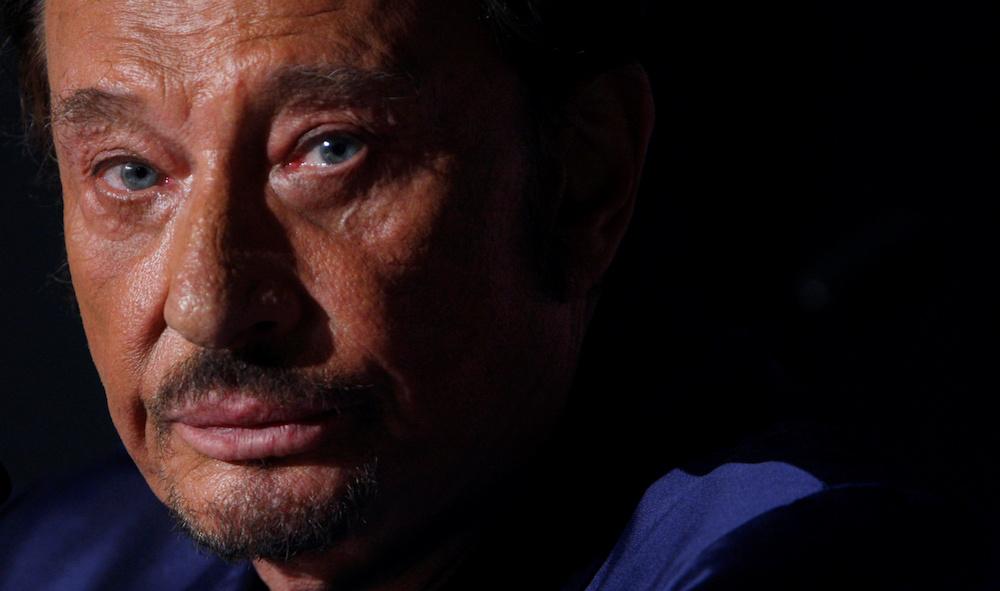Johnny Hallyday, ‘The Elvis of France,’ dies at 74
Cast member Johnny Hallyday attends a news conference for the film "Vengeance" by director Johnnie To at the 62nd Cannes Film Festival, in Cannes, France, May 17, 2009.
France mourned on Wednesday its most famous rocker Johnny Hallyday, whose power ballads and colorful personal life made him a national treasure, loved by everyone from rebellious teens in the 1960s to modern-day presidents.
After a life featuring five marriages, numerous car crashes, drug problems and thousands of performances in tight leather trousers, the man known as the French Elvis died aged 74 on Wednesday after a battle with lung cancer.
The twinkly-eyed star emerged in the late 1950s, breaking from France's classic "chanson" tradition with his US-influenced rock 'n' roll and becoming a symbol of youthful defiance in the postwar era.
While Americans were going wild for Elvis or Jimi Hendrix and Britain was gripped by Beatle-mania, France took to the Paris-born crooner who borrowed liberally from his English-speaking peers.
"There is something of Johnny in all of us," French President Emmanuel Macron said in a pre-prepared statement issued after the announcement of his death. oembed://https%3A//www.youtube.com/watch%3Fv%3DoOrdANUWtHIWell-wishers gathered in the cold before dawn outside Hallyday's home in the small town of Marnes-la-Coquette west of Paris, as television channels cleared their regular programming for tribute shows.
"I rate him on the level of the Eiffel Tower," said Jose Albine, who was among the crowd at his home and claimed to have been to "hundreds" of Johnny concerts.
The death of the half-Belgian millionaire, whose cocaine use and playboy lifestyle burnished his rocker image, prompted a nationwide bout of nostalgia for one of only a handful of unifying national entertainers.
"With such a long career he touched every generation," said Nicolas D'Auria, a 40-year-old decorator in central Paris who recalled listening to Hallyday on cassettes in the car on family holidays in his youth.
"I'm sure my uncle is crying in front of the television," he told AFP, adding that he hoped there would be a national commemoration, which Macron is expected to announce.
The French media was awash with tributes, with the Figaro newspaper running the headline "France's last idol is gone" and France 2 television saying "France wakes up a orphan."
Idolized by fans
Former president Nicolas Sarkozy — who once tried to tempt the man known universally as Johnny back from tax exile in Switzerland — said he represented "part of our personal history… our memories and emotions."
From early on in a career that spanned five decades, Hallyday drove his fans wild, prompting scenes of hysteria in a conservative France then led by the stiff General Charles de Gaulle.
"There was a craze for Johnny because he embodied the rock 'n' roll movement all by himself," Didier Varrod, a French music journalist and specialist on Hallyday, told AFP.
Born on June 15, 1943 to a alcoholic Belgian father and French mother, the performer was brought up by his aunt and had little schooling before emerging as an entertainer while still in his teens.
Baptised Jean-Philippe Smet, which in his own words "wasn't a very rock 'n' roll name", he went by Johnny Hallyday on stage.
'He is France'
His death was announced by his 42-year-old wife Laeticia Hallyday, who announced in a statement to AFP that "my man is no longer with us."
"He left us tonight as he lived his whole life, with courage and dignity," she said.
Tributes poured in from fellow entertainers including Celine Dion and Lenny Kravitz, as well as from French politicians of all stripes.
"Johnny is a monument. He is France," said actress Brigitte Bardot, a fellow icon of the postwar era. oembed://https%3A//www.youtube.com/watch%3Fv%3DLknViKjrs0w
Reaction outside of the francophone world was one of bafflement, however, as many people discovered one of the biggest rock stars they had never heard of.
"My international career? It'll happen if it happens," Hallyday once told AFP. "But I don't specially want to succeed elsewhere. It's better to be king in one's own country than a prince elsewhere."
Some critics recalled that he was often dismissed as a French-made derivative of Anglo-American music.
"There was something comical about his determination to copy — and some would say murder — every passing fashion in Anglo-Saxon popular music for half a century," John Lichfield wrote in a column for the Guardian newspaper.
Since announcing his cancer in March, rumors about Hallyday's health had swirled in recent weeks after he was admitted to hospital in Paris with breathing problems.
He spent six days receiving treatment before returning to rest at home.
Our coverage reaches millions each week, but only a small fraction of listeners contribute to sustain our program. We still need 224 more people to donate $100 or $10/monthly to unlock our $67,000 match. Will you help us get there today?
